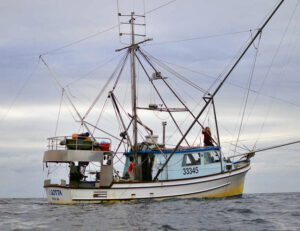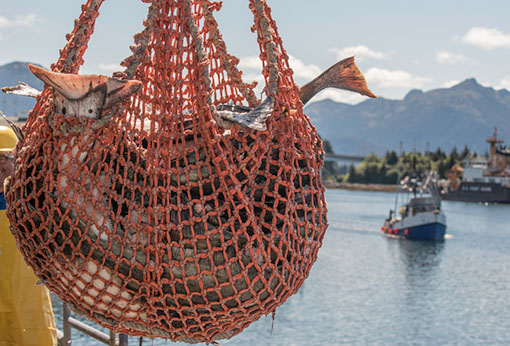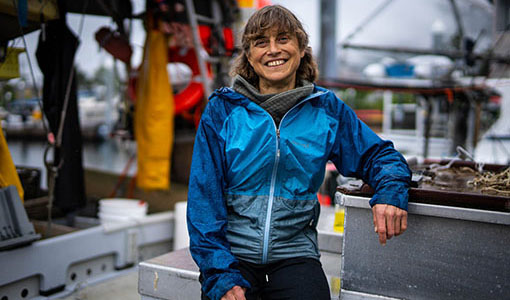
Harvesters with the Alaska Longline Fishermen’s Association (ALFA) are collaborating with the Department of Energy’s Energy Transitions Initiative Partnership Project (ETIPP) to test the future of energy-efficient low emissions fishing vessels powered by battery-electric motors.
Plans are for a 46-foot commercial fishing boat, the I Gotta, to cruise into the cold waters of Sitka this fall, cut its diesel engine and turn on a low-and zero-emissions propulsion system, becoming one of the first low-emissions fishing vessels ever deployed in Alaska.
Officials with the federal Energy Department’s National Renewable Energy Laboratory (NREL) in Golden, Colo. announced Aug. 22 that when using a unique parallel hybrid battery-diesel system, the boat can travel at full speed using its diesel engine, then switch to a battery-electric motor while fishing. This would allow the I Gotta’s captain, Eric Jordan, to cut the vessel’s fuel use by 80%.
The project has, NREL notes, taken a village—and several years of collaboration. It got its start when ALFA applied for support with the Energy Department’s Energy Transitions Initiative Partnership Project (ETIPP) to assess options for fishing vessel hybridization.
ETIPP then paired ALFA with commercial vehicle researchers at NREL and Sandia National Laboratories. Retrofitting of the I Gotta has been funded with grant support from AgWest Farm Credit and Acme Seafoods.

ALFA has said that its goal is to inspire decarbonization efforts across its entire fleet and beyond.
The organization’s executive director, Linda Behnken, told NREL that ALFA, with more than 160 small-boat commercial harvesters, tends to be leaders in climate and environmental space in Alaska. ALFA harvesters, who are committed to sustainable salmon fishing far into the future, are eager to reduce their greenhouse gas emissions and fuel costs, Behnken said.
However, she said, small boat harvesters can’t risk being early adopters of a new technology if it stands to jeopardize their fishing season, even when high fuel costs eat up as much as 30% of their earnings.
To reduce the risk, Behnken applied to join ETIPP, a network of regional organizations and DOE national laboratories that helps remote and island communities to shift to renewable energy options.
Since ETIPP typically supports land-based communities, Behnken decided to see if it would support ALFA advancing energy efficiency in its fleet.
The quest to identify how the ALFA fishing fleet could decrease fuel use and increase fuel efficiency began with help from the Alaska Fisheries Development Foundation, which sent someone to Sitka to measure torque on boat propellers and started working with a lot of fishing boats across the Gulf on fuel use.
ALFA also built an online audit tool to track fuel consumption at various vessel speeds and when hydraulics are running.
One example for vessel captains to consider, Behnken remarked, would be whether to go slower and use less fuel when returning to town after fishing, although it would take a little longer to get there.
“We shared all that information with the fleet and then started thinking about decarbonizing the fleet,” she said, adding that some harvesters are also interested in looking at the environmental benefits and savings of the next generation of fuel.
Since Jordan fishes near Sitka and comes back to town almost every night, he’s able to recharge his batteries and his fuel savings is about 80%, Behnken stated. Other harvesters are doing three-to-five-day trips, where they have to recharge their battery from a diesel engine, and their overall savings is 12-20%, depending on how much recharging they have to do off of diesel, she said.

The equipment for Jordan’s boat cost about $100,000 for the electric engine and installation and changes in the engine room, but if you start to convert more of the fleet, costs come down, she said.
“Technology when it is new tends to be more expensive,” Behnken said. “Our goal is to make the hybrid process more successful and more affordable. Right now it is not very cost efficient. We had to find grant money to do this,” she said.
Still, Behnken said she’s mindful that fishermen and others don’t have long before climate change undermines the health of the ocean.
“It is important to be part of the solution of decarbonizing our fleet,” she said, adding that the marine transportation industry as well as fishing fleets would need to collaborate on that.
ALFA was accepted into the ETIPP project in 2021, when the partnership matched the fishing cooperative with NREL transportation researchers who specialize in technical assistance for commercial vehicle decarbonization.
According to NREL, researchers considered potential solutions to allow small fishing boats to cut fuel dependency without sacrificing speed or range.
Commercial vehicle electrification researcher Michael Lammert, the project’s principal investigator, said researchers looked at running the boat off of next-generation fuels like hydrogen, as well as fully battery-electric scenarios and the charging infrastructure that would be needed. They chose a plug-in hybrid model for the I Gotta.
NREL and ALFA project partners selected the Transfluid hybrid propulsion system that allows the I Gotta to switch between a diesel engine for top speeds and a battery-electric motor to cruise through favored fishing spots.
Electricity for the boat is to come from hydroelectric dams in Sitka, Alaska, a 100% renewable source that reduces the boat’s greenhouse gas emissions.
NREL said the I Gotta’s hybrid system will be “smart,” meaning it will be capable of optimizing use of the engine and motor, and the boat is equipped with data loggers to measure fuel efficiency.
Margaret Bauman can be reached at margie@maritimepublishing.com
